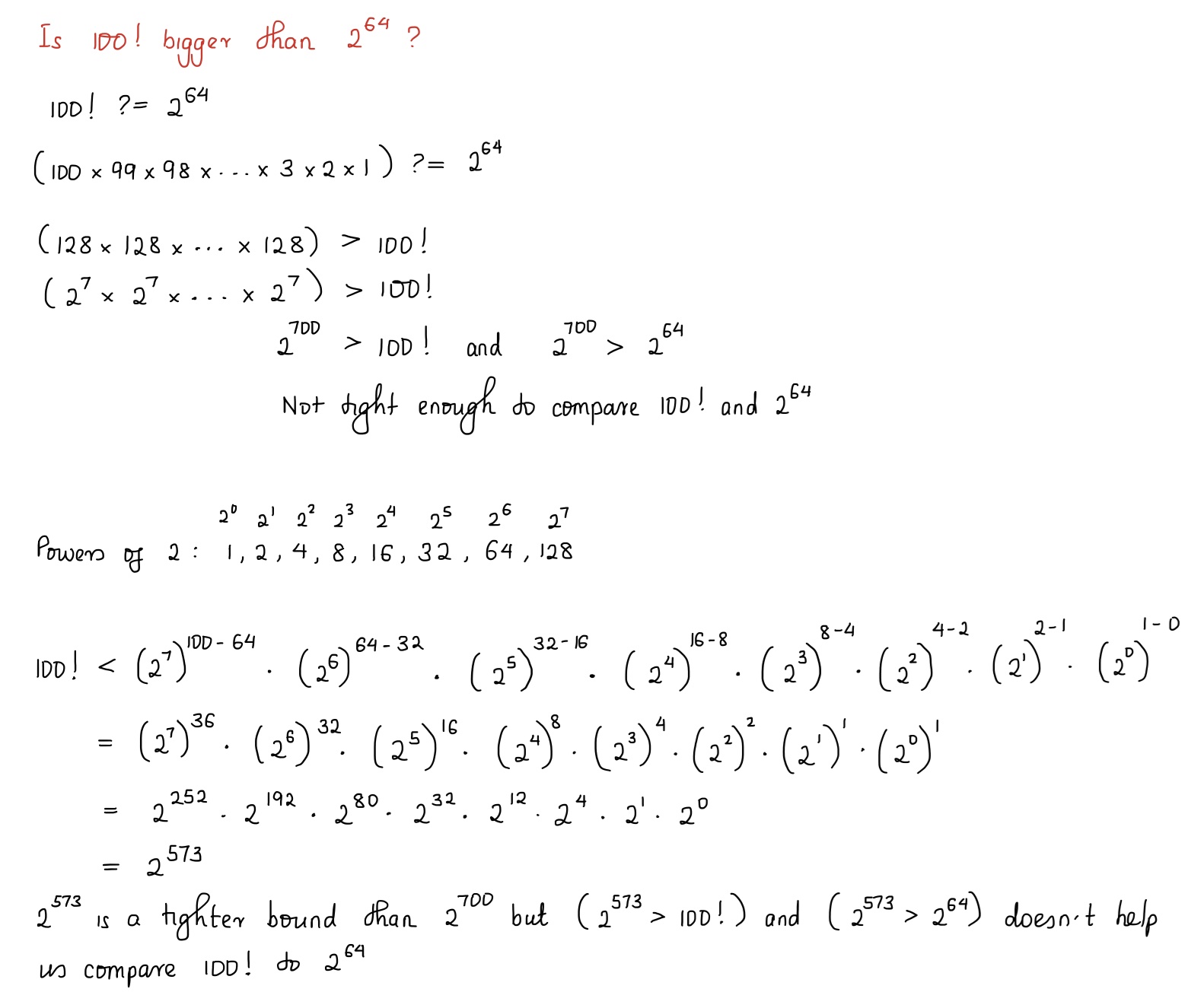Problem Statement
\(n!\) means \(n \times (n - 1) \times … \times 3 \times 2 \times 1\).
For example, \(10! = 10 \times 9 \times … \times 3 \times 2 \times 1 = 3628800\), and the sum of the digits in the number \(10!\) is \(3 + 6 + 2 + 8 + 8 + 0 + 0 = 27\).
Find the sum of the digits in the number \(100!\)
My Solution
It doesn’t look like we can do without calculating the actual value of \(100!\), and that is something that is too burdensome to compute by hand. Programming it is!
How big is \(100!\)? Most programming languages have built-in support for numbers less than \(2^{64} - 1\).

Using Stirling’s approximation, \(\log_{k}(n!) \approx n \log_{k}(n) - n \cdot \log_{k}(e)\), determines that \(n!\) starts outgrowing \(2^{n}\) when \(n \approx e \cdot k\). In practice tend to use \(n \gg e \cdot k\), so we assume that factorials grow faster than exponentials.
In our case, \(100 \gg 2 \cdot e\), and so the most convenient language for this problem is one that has large integer support, e.g. Python.
>>> from math import factorial
>>> s = f"{factorial(100)}"
>>> sum(int(i) for i in s)
648
But what about Lisp? I’ve seen it enough times on Hacker News to want to toy with it. Common-Lisp.net seems like a good starting point. Portacle , the recommended beginner-friendly way to run Lisp, does not work for me despite trying these workarounds . has some alternate instructions.
Common Lisp is a standard, and Steel Bank Common Lisp (SBCL) is a popular Common Lisp implementation. Quicklisp is a package manager. SLIME: The Superior Lisp Interaction Mode for Emacs is a popular Common Lisp IDE built on Emacs. These components might not have been as apparent if Portacle worked as expected. Furthermore, I took less time to get my setup via this “longer” route.
Emacs has an emphasis on being productive from the keyboard, e.g. providing alternatives to using the arrow keys to avoid leaving the touch typing position. However, I still like VS Code because of the extensions that I have. Presumably, once I customize Emacs in a similar way, I’ll move into the Emacs camp and join the eternal Emacs vs. Vim wars. Emacs Keymap provides Emacs keyboard shortcuts in VS Code.
has a nice video of setting up Common Lisp, Emacs, Slime and Quicklisp such that we can iterate on the code efficiently. I think that’s pretty cool. Python’s REPL is the closest that I’ve come to such a development environment.
#|
Common Lisp objects have types, while variables do not.
https://lispcookbook.github.io/cl-cookbook/type.html
|#
(defun factorial (n)
"Return the factorial of n."
; Return statements don't need to be explicit. The result of the last
; evaluated expression is returned.
(if (= n 1)
n
(* n
(factorial (- n 1)))))
(defun sum_of_digits (n)
"Return the sum of the digits in n."
#|
* https://lispcookbook.github.io/cl-cookbook/strings.html
* https://lispcookbook.github.io/cl-cookbook/iteration.html
|#
(loop for c across (write-to-string n)
sum (parse-integer (string c)) into total
finally (return total)))
(defun project_euler_020 ()
"Solve https://projecteuler.net/problem=20"
(write (sum_of_digits (factorial 100))))
Emacs + Slime has a steep learning curve. The keyboard bindings are
unlike anything that I frequently use. However, I think we did use
either Vim or Emacs in COS 217, because C-x C-s to save a file feels
familiar.
First impressions of Lisp development: the code is quite readable.
Pleasantly surprised by sum (parse-integer (string c)) into total.
Learning from Others' Solutions
I could have gone without the integer to string to characters to integers roundtrip, e.g.
def sum_of_digits(n):
total = 0
while (n > 0):
total += n % 10
n = int(n / 10)
return total
Ruby and Haskell seem elegant. Should try them in the next Project Euler challenge.
References
- #20 Factorial digit sum - Project Euler. projecteuler.net . Accessed Jan 15, 2022.
- Which function grows faster, exponential or factorial? - Stack Overflow. stackoverflow.com . Accessed Jan 16, 2022.
- Getting Started | Common Lisp. lisp-lang.org . Accessed Jan 16, 2022.
- Installing Common Lisp, Emacs, Slime & Quicklisp - YouTube. www.youtube.com . Accessed Jan 16, 2022.
- Thread 20 - Project Euler. projecteuler.net . Accessed Jan 16, 2022.
Mistakenly did
brew install emacsinstead ofbrew install --cask emacsas advocated for by GNU Emacs download - GNU Project .homebrew-caskextends Homebrew by installing and managing GUI macOS applications .